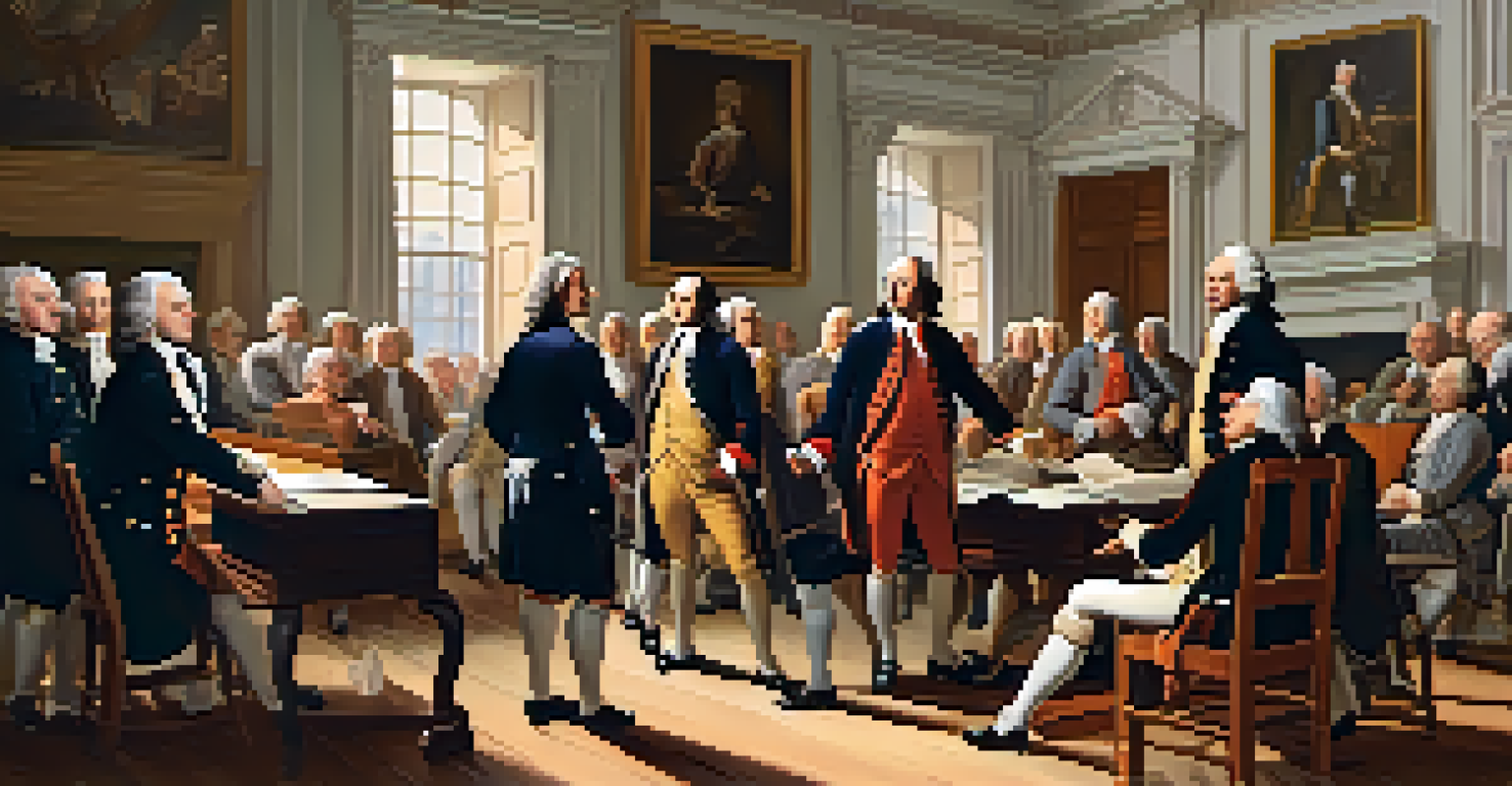Boston's Role in the American Revolution and Diplomacy

The Spark of Revolution: Boston's Early Resistance
In the years leading up to the American Revolution, Boston became a hotbed of dissent against British rule. The imposition of taxes, such as the Stamp Act, ignited widespread protests, showcasing the city's growing frustration. Notably, the Boston Tea Party in 1773 served as a dramatic act of defiance, reflecting the colonists' demand for representation and fairness. This pivotal moment not only rallied support within Massachusetts but also galvanized other colonies to join the cause.
The American Revolution was a beginning, not a consummation.
The Boston Sons of Liberty played a crucial role in orchestrating these protests, using pamphlets and public gatherings to spread their message. Their efforts helped to create a sense of unity among the colonists, fostering a collective identity that was essential for the revolutionary movement. As tensions escalated, Boston emerged as a symbol of resistance, drawing attention from both colonial supporters and British authorities alike.
This atmosphere of revolt was critical in shaping the trajectory of the American Revolution. Boston's actions helped to inspire the formation of the Continental Congress, where representatives from various colonies gathered to coordinate their efforts. The city's early resistance laid the groundwork for a broader movement that would ultimately lead to the fight for independence.
Boston Massacre: A Turning Point in Colonial Sentiment
On March 5, 1770, the Boston Massacre occurred, marking a significant turning point in colonial sentiment against British rule. This tragic event, where British soldiers killed five colonists, was heavily publicized by local leaders, including Paul Revere and Samuel Adams. They framed the incident as a brutal attack by the British, rallying public outrage and solidifying anti-British sentiment throughout the colonies.

The Massacre served as a powerful propaganda tool, with artworks depicting the event circulating widely and fueling the desire for independence. It exemplified the growing divide between the colonies and the British government, illustrating the risks colonists faced in their fight for rights. The incident not only united Bostonians but also resonated with those in other colonies, who began to see the British as oppressors rather than protectors.
Boston's Defiance Sparked Revolution
Boston's protests, particularly the Boston Tea Party, showcased the growing resistance against British rule and galvanized support for independence.
As a result of the Boston Massacre, calls for armed resistance grew louder, and the desire for independence became more pronounced. The incident highlighted the dangers of British military presence in American towns and helped to mobilize support for the revolutionary cause. The legacy of the Massacre remains a stark reminder of the sacrifices made in pursuit of freedom.
The Role of Boston in Creating Revolutionary Networks
Boston's significance in the American Revolution extended beyond protests and violence; it also served as a hub for revolutionary networks. The city was home to influential figures like John Hancock and Samuel Adams, who played crucial roles in organizing resistance efforts. They established committees of correspondence that facilitated communication between the colonies, ensuring that revolutionary ideas and strategies were widely shared.
Freedom is not worth having if it does not include the freedom to make mistakes.
These networks were vital in coordinating actions against British policies, allowing colonies to present a united front. Boston's leaders recognized the importance of collaboration and shared intelligence, which strengthened the revolutionary movement. This sense of solidarity fostered resilience among the colonies, encouraging them to stand together in the face of oppression.
Furthermore, these networks laid the groundwork for the eventual formation of the Continental Army, with many soldiers hailing from Boston and its surrounding areas. The city's ability to mobilize resources and unite different factions became essential in the fight for independence. Boston's role as a revolutionary hub significantly influenced the overall success of the American Revolution.
Diplomatic Efforts: Boston's Influence on Foreign Relations
As the American Revolution unfolded, Boston's influence extended into the realm of diplomacy. Key figures like John Adams, who hailed from Boston, played a pivotal role in establishing relationships with foreign powers. Adams recognized that gaining support from countries like France was crucial for the colonies' success in their fight against Britain.
Boston served as a launching pad for diplomatic missions, with its leaders advocating for international recognition of American independence. The city's reputation as a center of revolutionary fervor helped attract attention from foreign governments, which began to see the potential for a new ally in the Americas. This international interest was essential for securing military and financial assistance during the war.
Massacre Unites Colonists Against Britain
The Boston Massacre served as a turning point, fueling anti-British sentiment and uniting the colonies in their struggle for rights and representation.
Ultimately, Boston's early diplomatic efforts contributed to the success of the American Revolution, as alliances formed with foreign nations. The subsequent Treaty of Paris in 1783, which acknowledged American independence, was in part a result of the groundwork laid by Boston's leaders. This highlights how the city's influence reached beyond its borders, shaping the future of the young nation.
The Boston Tea Party: A Bold Statement of Defiance
The Boston Tea Party, a major event in 1773, epitomized the colonists' growing resistance to British taxation. In response to the Tea Act, which granted the British East India Company a monopoly on tea sales, a group of colonists disguised as Native Americans boarded ships in Boston Harbor. They dumped 342 chests of tea into the water, making a bold statement against what they viewed as unjust taxation without representation.
This act of defiance not only showcased the colonists' determination but also served as a rallying point for revolutionary sentiments across the colonies. The event was meticulously planned and executed, demonstrating the organization and commitment of Boston's residents to their cause. It ignited a wave of similar protests in other colonies, amplifying the call for independence.
The British government responded harshly, implementing punitive measures known as the Intolerable Acts, which further united the colonies against British authority. The Boston Tea Party became a symbol of resistance, illustrating the lengths to which colonists would go to defend their rights. This pivotal moment solidified Boston's role in shaping the revolutionary narrative and propelled the movement toward independence.
The First Continental Congress: Boston's Direct Impact
In response to the growing tensions with Britain, the First Continental Congress convened in 1774, and Boston's actions were instrumental in its formation. The city had already demonstrated its willingness to take a stand against British policies, prompting other colonies to come together to discuss a unified response. Boston's protests and the subsequent Intolerable Acts underscored the urgency for collective action among the colonies.
Delegates from twelve colonies gathered in Philadelphia, where they debated strategies for resisting British control. Many of these representatives were directly influenced by the events unfolding in Boston, reflecting the city's pivotal role in igniting revolutionary fervor. The Congress issued the Declaration of Rights and Grievances, articulating the colonists' demands for fair treatment and representation.
Boston Fostered Revolutionary Networks
Boston was a crucial hub for revolutionary leaders and networks, facilitating communication and collaboration among the colonies during the fight for independence.
Ultimately, the First Continental Congress set the stage for the American Revolution, demonstrating the power of collaboration among the colonies. Boston's experiences and leadership greatly contributed to the development of a unified front against British oppression. This gathering marked a significant step toward independence, with Boston at the heart of the revolutionary movement.
Boston's Legacy: Shaping a Nation's Identity and Values
Boston's role in the American Revolution and early diplomacy has left a lasting legacy that continues to shape the identity and values of the United States. The city's commitment to freedom, justice, and representation resonated deeply with the ideals espoused by the Founding Fathers. As a result, Boston is often celebrated as a birthplace of American democracy, embodying the spirit of resistance and self-determination.
The events that unfolded in Boston laid the groundwork for the principles enshrined in the Constitution and the Bill of Rights. The city's history of activism and civic engagement serves as an inspiration for future generations, reminding Americans of the importance of standing up for their rights. This legacy is evident in the ongoing struggles for social justice and equality across the nation.

Moreover, Boston's significance extends beyond its historical context; it remains a vibrant center for culture, education, and innovation. The city's rich history continues to be a source of pride, drawing visitors who seek to understand the roots of American democracy. Boston's enduring impact on the nation underscores its pivotal role in shaping the course of history during the American Revolution and beyond.